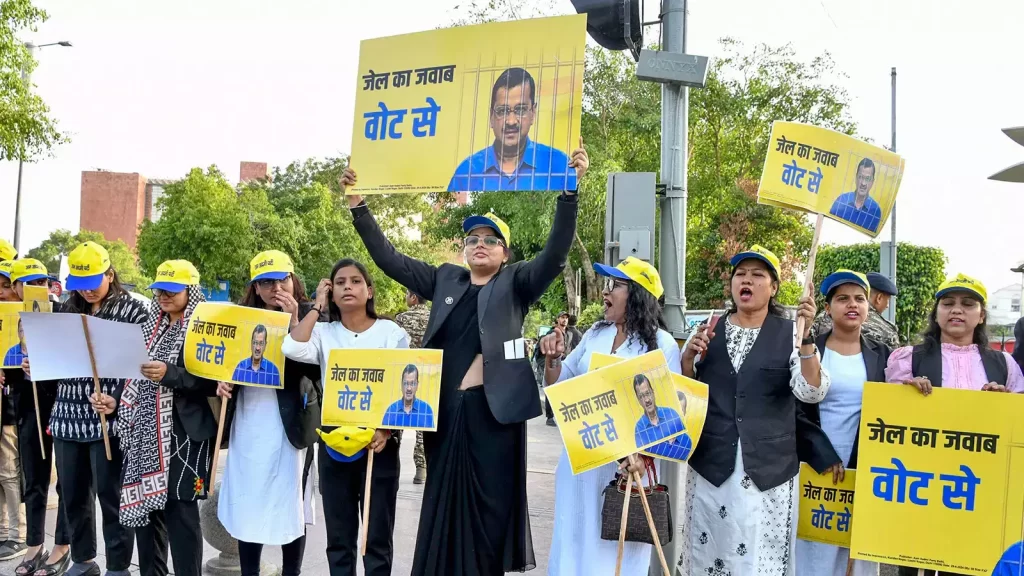Corruption charges are common in politics. The difference today is that draconian laws, notably on money laundering and unlawful activities, are being used to jail foes without bail. BJP calls this effective enforcement. Opposition parties call it vendetta.
Psephologist Yogendra Yadav calls this the most unfair election ever. So does Trinamool Congress. The foreign media have uttered similar sentiments. BJP will disagree. But the Aam Aadmi Party (AAP) will agree passionately. It says the party seeks to win by jailing opponents and threatening those still free.
The charges against top AAP leaders are based on confessions from some parties in a liquor scam. And AAP has some serious questions to answer. But this should mean quick trials with the accused out on bail. It should not mean endless jail without bail. “The process is the punishment,” to quote the Supreme Court.
Delhi chief minister Arvind Kejriwal is in jail. So are deputy chief minister Manish Sisodia and former health minister Satyendra Jain. So too, for months was Rajya Sabha MP Sanjay Singh. The most prominent AAP leader left, Atishi, alleges— so far without any proof—the BJP and enforcement agencies are targeting her and three others, and that she has been told to join BJP to avoid arrest.
Corruption charges are common in politics. These are sometimes followed by arrests, but the accused stay out on bail and remain in active politics for decades. Hundreds escape conviction thanks to a gentleman’s agreement (you could call it honour among thieves) between most parties to ensure weak prosecutions to keep politicians of all stripes out of jail.
The difference today is that draconian laws, notably on money laundering and unlawful activities, are being used to jail foes without bail. BJP calls this effective enforcement. Opposition parties call it vendetta.
Many of those targeted have defected. According to a report in The Indian Express, since 2014, no less than 23 of the 25 top politicians who, in recent years, defected to the BJP had cases against them dropped or prosecutions halted. Doesn’t this have some similarities to the standard offer made by Central American cartels to those who came in their way— ‘Join us and become rich, or oppose us and die’?
Institutional independence has eroded deeply. Consider last week’s attempt by the Chief Electoral Officer of Delhi to stop AAP from using election songs to protest Kejriwal’s jailing. ‘Jail ka jawab hum vote se denge’ (we will respond to jailing through the ballot box) is how the lyrics went. What’s wrong with winning through the ballot?
The CEO says the slogan casts aspersions on the judiciary, something forbidden in the cable TV network rules. Fiddlesticks. The song casts aspersions not on the judiciary but on the misuse of draconian laws meant to be used against terrorists and big gangsters. AAP’s slogan, that it will respond through the ballot box, is a non-violent, democratic approach that the Election Commission should applaud, not censor.
The CEO objects that the phrase ‘Tanashahi party ko hum chot denge’ (We will hurt the party of autocracy) incites violence. Sorry but election slogans against ‘tanashahi’ are as old as the hills, made in election after election since Independence. They are more likely to incite yawns than violence. Censoring an election ditty on this ground is senseless.
The third objection is to the phrase ‘gundagardi ke khilaf vote denge’ (we will vote against hooliganism). This in the AAP song is accompanied by the ‘tanashahi’ phrase and a clip showing former Delhi deputy chief minister Manish Sisodia being escorted by the police. The CEO claims, “The words and the clip tend to present the picture of police in bad taste. It thus casts aspersions on their working and has defamatory and slanderous remarks for the police.”
Sorry but election slogans against ‘tanashahi’ are as old as the hills, made in election after election since Independence.
Preposterous! The words and clips are clearly directed at the BJP, not the police. Besides, voters do not merely “cast aspersions” on the police but lambast them with a hundred curses. The judiciary has often castigated the police too. Yet the CEO wants to ban criticism of the police.
‘Awazein khilaf thi jo sabko jail me daal dia, bas unko hi bahar rakha jisne inko maal dia. Itna lalach, itna nafrat, bhrashtachari se mohabbat.’ This is a poetic way of saying “Opposing voices are jailed, only those escape who pay up. So much greed and hate speech. They are in love with corruption.” This, says the CEO is “slanderous”, and “a criticism of the ruling party on the basis of unverified facts and also casts aspersions on the judiciary.” Such phrases have been common in elections so why the sudden expression of horror?
The Election Commission is supposed to be independent. Will it override its Delhi CEO? If not, accusations will grow about an unfair election.


